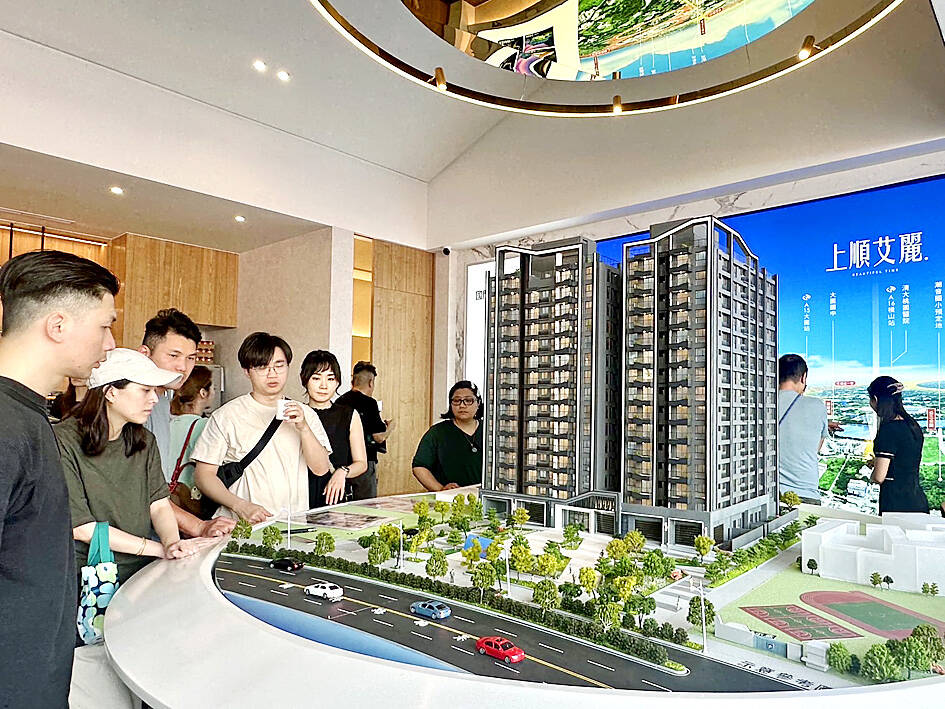Presale housing projects in northern Taiwan for the sales season beginning on Monday next week total NT$213.46 billion (US$6.59 billion), a 17.2 percent pickup from a year earlier, as developers apparently emerge from monetary tightening and unfavorable policy measures, property research My Housing Monthly found.
It is the highest volume since 2021, when the government tightened property taxes, raised interest rates and banned transfers of presale house purchase agreements to slow capital flows to the property market and curb house price hikes, the magazine’s spokesman Chen Ping-chen (陳炳辰) said.
The change in sentiment has to do with Taiwan’s improving economy and ongoing rallies on the local bourse, which lends support to a wealth effect, Chen said.

Photo: Hsu Yi-ping, Taipei Times
The government’s interest subsidy for first-home purchases has also motivated people to take action, Chen added.
Presale houses even reaped a windfall from the April 3 earthquake, which measured magnitude 7.2 on the Richter scale, and the ensuing aftershocks, as new houses are believed to be more quake resistant, the analyst said.
New Taipei City would see the entry of NT$102.7 billion of presale projects, accounting for 48.1 percent of the overall volume, as developers plan to build major apartment complexes of over NT$10 billion in Sanchong (三重), Jhonghe (中和) and Linkou (林口) districts, the publication said.
These second-tier districts have gained popularity in recent years on the back of relative affordability, and enhanced transport convenience and ease of living, Chen said.
In addition, Banciao (板橋), Wugu (五股) and Damshui (淡水) districts would have presale projects valued between NT$3 billion and NT$6 billion, the publication said.
Taoyuan and Taipei would be home to presale projects of NT$52.6 billion and NT$48.35 billion, contributing 24.6 percent and 22.7 percent respectively, Chen said.
Developers are seeking to introduce residential complexes near Taiwan Taoyuan International Airport, which is building a new terminal to meet growing demand for cross-border air traffic as Taiwan’s importance on the world stage continues to rise, Chen said.
Presale projects in Taipei are concentrated in Wenshan (文山), Zhongzheng (中正) Zhongshan (中山) and Beitou (北投) districts.
The capital city always captures the attention of developers, although soaring house prices have scared away young and less well-off buyers, Chen said.
Developers in Hsinchu City and Hsinchu County were relatively quiet, given the overall volume was at NT$5 billion.
The conservative practice mainly reflects a patient strategy on the part of developers who opt to digest unsold houses on hand first, rather than cut prices to facilitate sales, Chen said.
Some had to postpone marketing schedules due to failures in obtaining licenses or building reception facilities, the analyst said.

Intel Corp chief executive officer Lip-Bu Tan (陳立武) is expected to meet with Taiwanese suppliers next month in conjunction with the opening of the Computex Taipei trade show, supply chain sources said on Monday. The visit, the first for Tan to Taiwan since assuming his new post last month, would be aimed at enhancing Intel’s ties with suppliers in Taiwan as he attempts to help turn around the struggling US chipmaker, the sources said. Tan is to hold a banquet to celebrate Intel’s 40-year presence in Taiwan before Computex opens on May 20 and invite dozens of Taiwanese suppliers to exchange views

Application-specific integrated circuit designer Faraday Technology Corp (智原) yesterday said that although revenue this quarter would decline 30 percent from last quarter, it retained its full-year forecast of revenue growth of 100 percent. The company attributed the quarterly drop to a slowdown in customers’ production of chips using Faraday’s advanced packaging technology. The company is still confident about its revenue growth this year, given its strong “design-win” — or the projects it won to help customers design their chips, Faraday president Steve Wang (王國雍) told an online earnings conference. “The design-win this year is better than we expected. We believe we will win

Chizuko Kimura has become the first female sushi chef in the world to win a Michelin star, fulfilling a promise she made to her dying husband to continue his legacy. The 54-year-old Japanese chef regained the Michelin star her late husband, Shunei Kimura, won three years ago for their Sushi Shunei restaurant in Paris. For Shunei Kimura, the star was a dream come true. However, the joy was short-lived. He died from cancer just three months later in June 2022. He was 65. The following year, the restaurant in the heart of Montmartre lost its star rating. Chizuko Kimura insisted that the new star is still down

While China’s leaders use their economic and political might to fight US President Donald Trump’s trade war “to the end,” its army of social media soldiers are embarking on a more humorous campaign online. Trump’s tariff blitz has seen Washington and Beijing impose eye-watering duties on imports from the other, fanning a standoff between the economic superpowers that has sparked global recession fears and sent markets into a tailspin. Trump says his policy is a response to years of being “ripped off” by other countries and aims to bring manufacturing to the US, forcing companies to employ US workers. However, China’s online warriors